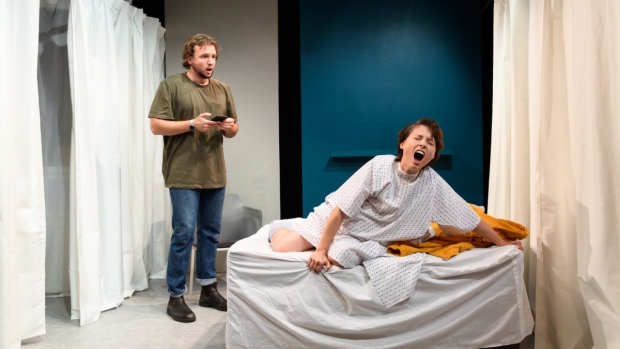Milk and Gall review – a surreal take on new motherhood in the Trump era
The show runs at Theatre503

© Jane Hobson
The world has its eyes on the results of the 2016 US election, but Vera (played by MyAnna Buring) has to keep one eye on Roddy, her newborn.
Milk and Gall is a captivating and comical show, following Vera as she unravels under the pressures of new motherhood and political despair in the aftermath of Trump's election. If those stressors weren't bad enough, she is struggling to connect with her seemingly a-political husband (Matt Whitchurch) and an unbearable mother-in-law (Jenny Galloway). "If I had known this is where it was going…I would never have had you," she says to Roddy.
No more than a year since the election, Milk and Gall successfully plunges us back into the feeling of staying up to scroll through election results on our phones – the brilliance of the show is found in the tension between the humour and the very real state of anxiety Vera experiences. We laugh at the ridiculous scenarios but equally, we are thrown back to that moment the world held its breath.
Mathilde Dratwa's script is surreal. Medical instruments ranging from surgical scissors to needles are hilariously disproportional in size to showcase Vera's perception of the hospital. Additionally, the baby is ever-changing – a swaddle of clothes at one point, shattered pieces at the next, and even, in one scene, edible. To highlight the endless cycle of pumping and breastfeeding, Vera is placed in a cow onesie complete with udders upon the front. Then, still in the onesie, she seduces her husband in an attempt to reignite their sex life. Later, technological assistant Alexa transforms into a real-life woman, decked out in a dazzling velvet jumpsuit and played by the smooth-talking Tracy Ann-Green, who proceeds to offer Vera advice on child-rearing. These surrealist elements always hit the humorous mark and manage to overturn our expectations every time. (Design and costume by Mona Camille and Malena Arcucci).
Director Lisa Spirling matches the pacing of Dratwa's snappy, vignette-esque scenes. Transitions are aided by Roly Botha's music design, and the play marches on to this terse drum score reminiscent of a military parade. Still there were a few moments in the show that would have benefitted from more space to breathe – there is a beautiful visual metaphor of baby Roddy rapidly losing weight – his weightlessness represented by a small, white balloon – and such moments could have been given more time to avoid losing impact.
The show also loses some of its political edge and commentary towards the middle, with wasted opportunities to delve into how Trump's presidency may have affected citizens the most. Dratwa tackles themes such as prejudice, which comes to a head in an argument between Vera and her Syrian-American best friend, Amira (Sherine Chalhie). The privileges of our leading couple are acknowledged, sometimes in a tongue-in-cheek manner, but some elements to this play feel unfinished – the unresolved argument over privilege between the best friends, a women's march that does little to propel the action forward and is never mentioned again, and Vera's search for new mummy friends (mostly Caribbean nannies)…these are all interesting and potentially politically complex narrative routes not fully pursued; the result of this is a wasted opportunity to further explore identity, race, class, politics, privilege and the impact of motherhood.
Despite losing some of its political edge, this was certainly brought back towards the end with Hillary Clinton (played by the hilarious, multi-rolling Galloway) literally crawling out of the TV to share a drink with Vera.












